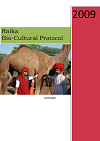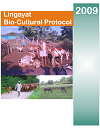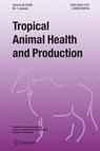Raika bio-cultural protocol
Sets out the biocultural values and explains how the Raika community of Rajasthan have developed and preserved unique breeds of livestock and traditional knowledge associated with them, and how their pastoral lifestyle has developed the co-evolved ecosystem of Rajasthan’s forests which they have traditionally conserved and sustainably used. It details their customary decision making process involved in providing free prior informed consent to any actions that relate to our grazing rights, animal genetic resources and associated traditional knowledge. It illustrates the disastrous impacts that the exclusion of the Raika from previously communal grazing areas and forests is having on their lives, livestock, genetic resources, traditional knowledge and the forest ecosystem itself. It articulates their forest access rights and rights over their genetic resources and associated traditional knowledge under Indian law. It calls upon the National Biodiversity Authority to recognize and support the Raika’s efforts to conserve their livestock breeds, environment and lifestyle.

Download document


